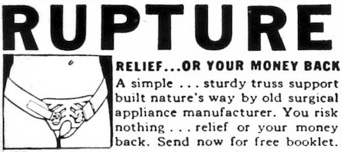Take Care!Do NOT go on any kind of active holiday or travel anywhere far from good surgical care with a known hernia condition. You are at risk AND may well find yourself uninsured under the terms of your travel insurance. |
There is always the option to do nothing – but what happens then?
Doing nothing leaves things as they are – and avoids any surgery (for the time being). This is obviously an attractive proposition on first sight, especially in cases where the hernia does not hurt so we think to ourselves it cannot be serious. However:
- any symptoms, such as discomfort and pain will also worsen, affecting your quality of life and ability to work (and play)
- delaying surgical repair and allowing the hernia to enlarge significantly is likely to make later operations more complicated if (when!) you do eventually have surgery
- there is always the risk of strangulation (where the bowel becomes trapped in the hernia and loses its blood supply) which requires emergency surgery
Do I have any non-surgical options?
Wear a corset or belt. Not ideal, can cause additional problems and it is difficult to find a good one. This was a favoured remedy in the last millennium as this old American advert shows. (The euphemistic word ‘Rupture’ has the same meaning in this context as ‘Hernia’.)

Note: Please do NOT send to us for such a booklet!!!
A truss is old-fashioned now. It is a belt with a pad that presses on the hernia defect to block the opening and stop the hernia popping out.
They never work well and carry the risk of unpleasant side-effects. They were popular when surgery was complex, dangerous and had a universally poor success rate.
Watchful Waiting
Two groups of surgeons looked at what would happen if you did not fix the hernia and just observed. It was called watch and wait.
The results at two years, published in the Journal of the American Medical Association (JAMA) and in the Annals of Surgery in 2006, were surprisingly similar and showed that almost one-quarter of the non-operated patients converted to surgery.
The conclusion was :
“This study has confirmed previous findings that most patients with minimal symptoms from an inguinal hernia develop pain over time. Pain was the most common reason for requesting operation, followed by effect on quality of life and increase in size of the hernia. Surgical repair is recommended for medically fit patients with a painless inguinal hernia.”
A subsequent study published by the American College of Surgeons found that the vast majority of patients who waited ended up having to have surgery anyway. Watchful waiting was held NOT to be an effective strategy.
Our advice is to find a specialist hernia unit and have the hernia repaired as soon as possible.
